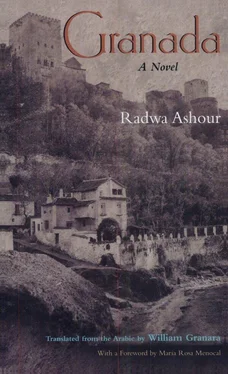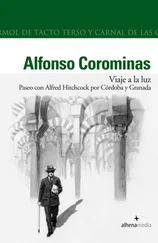Radwa Ashour - Granada
Здесь есть возможность читать онлайн «Radwa Ashour - Granada» весь текст электронной книги совершенно бесплатно (целиком полную версию без сокращений). В некоторых случаях можно слушать аудио, скачать через торрент в формате fb2 и присутствует краткое содержание. Год выпуска: 2003, ISBN: 2003, Издательство: Syracuse University Press, Жанр: Современная проза, Историческая проза, на английском языке. Описание произведения, (предисловие) а так же отзывы посетителей доступны на портале библиотеки ЛибКат.
- Название:Granada
- Автор:
- Издательство:Syracuse University Press
- Жанр:
- Год:2003
- ISBN:9780815607656
- Рейтинг книги:5 / 5. Голосов: 1
-
Избранное:Добавить в избранное
- Отзывы:
-
Ваша оценка:
- 100
- 1
- 2
- 3
- 4
- 5
Granada: краткое содержание, описание и аннотация
Предлагаем к чтению аннотацию, описание, краткое содержание или предисловие (зависит от того, что написал сам автор книги «Granada»). Если вы не нашли необходимую информацию о книге — напишите в комментариях, мы постараемся отыскать её.
Granada — читать онлайн бесплатно полную книгу (весь текст) целиком
Ниже представлен текст книги, разбитый по страницам. Система сохранения места последней прочитанной страницы, позволяет с удобством читать онлайн бесплатно книгу «Granada», без необходимости каждый раз заново искать на чём Вы остановились. Поставьте закладку, и сможете в любой момент перейти на страницу, на которой закончили чтение.
Интервал:
Закладка:
“But I swear to you, boss, there’s a lot of work, thank God! And if we’re two, we can get twice as much done.”
“But I can’t afford to pay two wages!”
Thinking there was no use pursuing this line of argument, Naeem changed his strategy. “Allow me to speak truthfully. I won’t beat around the bush since you’re my patron who’s treated me with respect and never refused me anything.
“Truthfully?”
“The truth is that I made a marriage proposal.”
“Did you find yourself a bride?”
“I haven’t found one yet, but I’ve hired a matchmaker. I also found a job that pays more money, and that will allow me to save what I need to take care of a family. But I said to myself that this is not the conduct of a gentleman, to leave a job suddenly, just like that, and abandon your boss. So I went to my friend and asked him to come back to his former profession.”
“Then you want to quit working with me?”
“God forbid, sir! It’s just that I am compelled to accept another job I don’t want, but I need the wages.”
“Is this friend of yours trustworthy? Can I depend on him?”
“Far more than me, sir.”
“Then let me see him.”
“Shall I go and fetch him?” Naeem asked as he sprinted to his feet.
“Not now. Finish what you’re working on, and then you can go and bring him.”
When he finished his work, he darted out and headed toward Abu Jaafar’s house. He ran through the side streets taking shortcuts until he reached their quarter. He then realized that he hadn’t thought about what he was going to say to Saad when he asks him about the job he was leaving the cobbler’s shop for. He needed to fabricate a convincing story that wouldn’t arouse any suspicion on his friend’s part. Naeem backtracked and walked on slowly, thinking; of a solution to his latest dilemma.
11
In the dark of night Abu Mansour stole away to his bathhouse, and when he arrived he paused for a few moments before taking out the key from his pocket. He inserted it into the keyhole and turned it twice, slowly. He pushed in the door and entered. Although he shut the door behind him gently, it made a loud squeaking sound that he was sure all of Albaicin heard. Despite the pitch-black darkness, Abu Mansour didn’t need to grope his way but rather proceeded five steps to the left and walked up three stairs. He stretched out his arm, took down the lantern, lit it, and put it back in its place. Then he went over and lit two smaller lamps, first on one side and then two more on the other.
He went over to the bench and sat down. He tilted his head backward slightly and closed his eyes as though he were giving himself over to sleep. He had no need at all to open his eyes or light the lanterns to decipher the details of the place, but he nevertheless opened them wide and began to inspect. There was the square carpeted courtyard as well as the four high arches that connected to a circular dome with drawings of leaves and branches in shades of a deep, rich olive green. And on the triangles that separate one arch from the other were drawings of Cordova with its Grand Mosque, its gardens and palaces. Abu Mansour stared at the pictures, then lifted his head and looked up at the dome. His eyes fell on the surface that held up the dome, counting the windows around it that he knew to be twelve. He counted them. Then his eyes moved over to the two cabinets facing one another before ascending three steps where they fell upon the three benches covered with rugs and carpets. On the wall behind the benches, there were pairs of niches, some holding lanterns and others for the folded towels that emitted the scent of dried lavender trussed into tiny cloth sacks pressed in between the folds.
Abu Mansour lifted his arms and leaned them against the back of the bench. He closed his eyes and saw his father yelling angrily and slapping him across the face, and himself running out of the house with the intention of never returning to that family that imprisons its sons, generation after generation, in a cage built by the madness of an old grandfather. The story of the grandfather, who, in actuality, was the father of his grandfather’s grandfather, was a family heirloom passed down from grandmother to grandfather, father, mother, aunt, and uncle, amassing detail upon tireless and endless detail as though it summarized all of existence.
The great-grandfather who emigrated from Cordova after its fall more than two hundred years ago, leaving behind his house and his bathhouse, arrived in Granada with nothing more than his wife and children, a little money in his pocket, and one solitary persistent desire that he wanted nothing more than to fulfill. What he dreamed by night and accomplished by day and all that he did in between was focused on this one desire: to build a bathhouse more grand than the one he once owned. So he left his wife and children and traveled to Syria to see for himself if what they say is true, that the bathhouses of Syria are more beautiful than those of Cordova. He made the journey, he looked around and compared. He came back two years later. The ship let him off at Malaga from where he returned in a procession of five donkeys. He rode one, the Damascene architect he brought back with him rode another, and he loaded the three remaining with all the things he bought to make a bathhouse from Damascus, Cairo, and Alexandria. When he came into the house to see his wife and unload his cargo, she burst into tears, not only because he forgot to bring her a piece of fine Damascene silk, but because he brought back nothing for his daughter’s wedding present, and because he came back with nothing for his son who awaited dutifully the father’s return to announce his own engagement.
Afeef began to build his bathhouse. He spent two whole years, day and night, supervising the construction. In the winter months he wrapped himself in an old woolen cloak, and in the summer he would only wear a light Tunisian jersey. In the bitter cold or scorching heat, he remained with the architect, the builders, and carpenters. They’d finish one door and he would shout in disappointment, “Do you call that a door? To me its’s just a slab of wood!” They’d react in bewilderment as they stepped back to inspect their delicately and meticulously carved workmanship. But Afeef dreamed of all the beautiful doors he saw in Cairo, Syria, and Cordova. “I’ll provide the wood and pay you whatever you want. But for God’s sake, you have to make a new door!”
The door, the pond, the marble fountain, the floral engravings on the dome, the chest, the bench, and the pendant lamp, all these things robbed Afeef of his time and money. He could always borrow the money, but how could he borrow time? Only one week after the completion of the bathhouse, Afeef passed away, leaving his wife and seven children heavily indebted to family, friends, and neighbors. But his children and grandchildren worked in the bathhouse, and God provided them with a decent living. They worked very hard and the Zayn Bathhouse of Afeef the Cordovan was a sight to behold and a comfort to the body, and with it the family settled the grandfather’s debts.
Abu Mansour stood up and went over to the chest he used as a safety deposit box where customers put their bundles of clothing and money. It was a long rectangular chest that rested on four wooden legs several inches from the ground. It was made of walnut wood carved with floral designs that intersected and crisscrossed, inlaid with pieces of ivory in square and triangular patterns whose bright creamy white contrasted sharply with the old dark wood.
Abu Mansour inserted the key into the metal lock and lifted the top of the chest. There was a small Quran inside as well as a handkerchief folded over some dried lavender flowers that diffused its overwhelming scent into his nose and chest.
Читать дальшеИнтервал:
Закладка:
Похожие книги на «Granada»
Представляем Вашему вниманию похожие книги на «Granada» списком для выбора. Мы отобрали схожую по названию и смыслу литературу в надежде предоставить читателям больше вариантов отыскать новые, интересные, ещё непрочитанные произведения.
Обсуждение, отзывы о книге «Granada» и просто собственные мнения читателей. Оставьте ваши комментарии, напишите, что Вы думаете о произведении, его смысле или главных героях. Укажите что конкретно понравилось, а что нет, и почему Вы так считаете.












